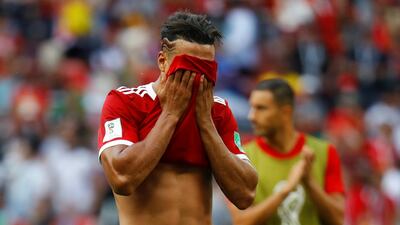Africa waited six-and-a-half hours for its first goal from open play at the Russia World Cup. It waited even longer for its first goal scored from open play by an African footballer. Until M'Baye Niang, born in France, and a former French Under 21 international, registered what turned out the match-winner for Senegal against Poland - who had fallen 1-0 behind to an own goal - it had been a barren tournament for a continent that endures football’s most hard to crack ceiling.
With less than a week gone, Egypt and Morocco are ready to book early flights home and if the circumstances of their losing starts might be deemed unlucky, there were some shared flaws. Egypt lost their opening match to Uruguay with an 89th minute goal; Morocco lost to a stoppage-time goal, to Iran, and to add insult to injury-time heartbreak, it was an own goal. Aziz Bouhaddouz's World Cup story was barely 15 minutes old when it turned tearful. He had come on a late substitute and thundered a header past his own goalkeeper from an Iran free-kick Morocco had not needed to concede.
When Tunisia also lost their opening fixture to a stoppage-time goal, it looked almost if last-minute fatigue was a North Africa contagion. Egypt and both the Maghreb teams were left on no points after the first round of matches because of goals scored after the 89th minute. And all from crosses into the penalty box from dead balls. Giving away goals at set-pieces is hardly an exclusively African flaw at this tournament of fruitful free kicks, corners and penalties but where fine margins are the difference between going him early and clawing a route to the knockout phase, attentiveness is everything.
________________
Read more on World Cup 2018:
John McAuley: Ronaldo on target and on a mission to single-handedly win the World Cup
Comment: Sadio Mane and the rest of Senegal's modern day stars owe class of 2002 a huge debt
Analysis: Why Ronaldo and the set-piece experts are rocking World Cup 2018
________________
Nigeria lost their opening fixture, thanks to, yes, an own goal - yes, after a corner had been inadequately repelled - and then a Croatia penalty when, again, a corner had panicked a defender, in this case William Troost-Ekong. With a determined Iceland facing the Super Eagles on Friday and then Argentina in wait in a final group match the South Americans will need a positive outcome from, Group D is not a happy place to be looking upwards from the bottom of.
"We need to be more professional with set-pieces," acknowledged Gernot Rohr, the German manager of Nigeria. "We will get better." Nigeria need to, and in a hurry. Iceland will direct high balls at them, from long throw-ins and free kicks and, having held Argentina to a draw on their debut at a World Cup, the smallest nation represented in Russia will take on Africa's most populous nation without cowering.
Nigeria reached the last 16 at Brazil 2014, so did Algeria. Two out of five in the knockout rounds was a small uptick on 2010, where, with the hosts South Africa increasing the continent’s representation to six teams but not doing anything to raise standards, only Ghana emerged from the group phase. Their tournament now looks like a landmark. Ghana reached the last eight and were denied a place in the semi-final by the notorious Luis Suarez handball on the Uruguay goal-line.
________________
Read more on World Cup 2018:
In pictures: Mohamed Salah's pain and brief joy as Egypt beaten by Russia
John McAuley: Rampant Russia too strong for Egypt as 2018 World Cup knockout stage beckons
Reacton: Egypt's Hector Cuper concedes future uncertain after probable World Cup exit in Russia
________________
Cameroon reached the last eight in 1990, and Senegal made the quarter-finals in thrilling fashion in Korea and Japan in 2002. One quarter-finalist per decade is a scant reward for the Africa that has given the game Uefa Champions League winners such as Samuel Eto'o, Didier Drogba and Yaya Toure and for that matter two of the past three PFA Players of the Year in the English Premier League, namely Riyad Mahrez and Mohamed Salah, the latter sadly missed because of injury by Egypt in their opening match at this World Cup, but unable to really affect their next outing, the defeat to Russia.
Morocco, like Egypt, are near the exit. They pushed and pushed at Portugal and played some fine attacking football. But their campaign is still without a goal or a single point. So responsibility is quickly loading onto Senegal, 2-1 winners over Poland thanks to Niang, the dual-national who switched from France to the country of his heritage last year, and to a Polish own goal that, after unlucky deflections suffered by Nigeria and Morocco, might have seemed like a form of karma for a continent. The Senegalese certainly feel they are flag-bearers for all Africa.
“We saw the other African teams lose their first games and it gave us power,” the striker Diafra Sakho told reporters. “I can guarantee the whole of Africa is supporting Senegal.”


